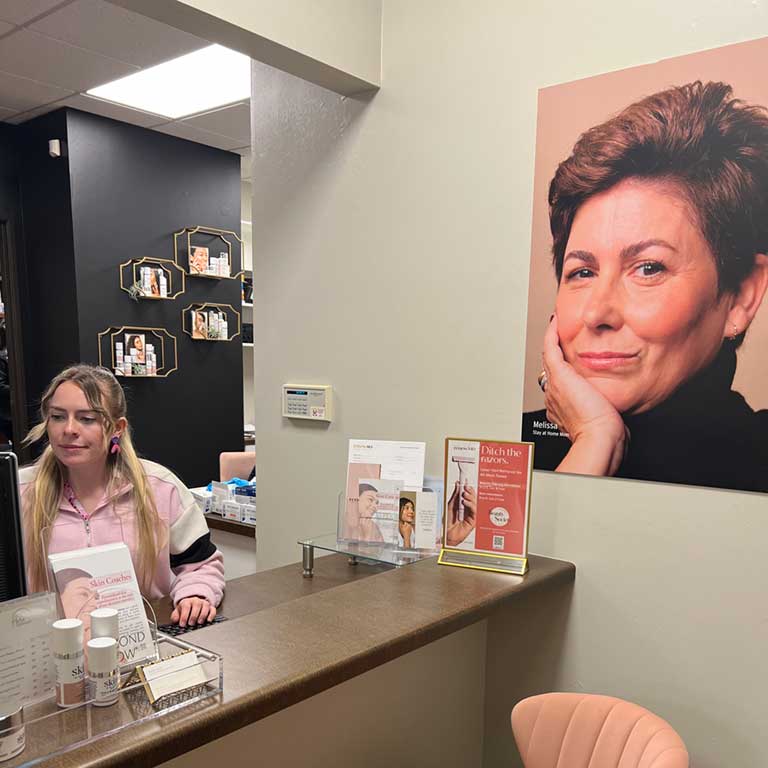Can PRP Therapy Give You Healthy Hair Growth?
In this blog, we’ll cover why hair loss occurs, what Plasma-Rich Platelet Therapy is and how it may be able to help you!
Hair is an important physical characteristic, and many people use it to express themselves, embrace their individuality, and personalize their appearance. Unfortunately, male hair loss can be painful for those experiencing it, who often feel unable to fight back against its effects. Not only can hair loss, especially against one’s will, damage confidence, but hair loss can also be a sign of physical health issues.
On The Skin Report podcast, Dr. Simran Sethi, an Internal Medicine doctor and the Founder and Medical Director of RenewMD medical spas, breaks down the reasons for male hair loss and how certain treatments can improve hair loss symptoms, and possibly even reverse prolonged hair fall out.
To understand the best methods for treating male hair loss, we must first consider why hair loss in men occurs, to better understand if it can be restored.
Male Hair Loss Causes and Concerns
There are various reasons that can be attributed to male hair loss. It is essential to understand the root cause of a person’s hair loss to determine the best treatment approach for them, as sometimes hair loss can be an indicator of other health conditions. Below are some of the most common causes of hair loss in men.
Androgenetic Alopecia
Androgenetic alopecia, also commonly referred to as male pattern baldness, is the leading cause of male hair loss. In fact, a study published in the National Library of Medicine found that over 50% of men above the age of 50 will experience male pattern baldness to some extent.
While we know hormones and genetics influence male pattern baldness, we are still unsure why men experience more hair loss than women, though this may be related to higher testosterone levels. Fortunately, hair loss therapies may help resolve these effects!
Stress
Stress is the second most common cause of hair loss in both men and women. Once the stressor has been removed, hair loss caused by stress is very treatable with certain hair loss therapies.
Hypothyroidism
Hypothyroidism is a less common cause of hair loss but can cause hair thinning. Therefore it is certainly something that people should be evaluated for if they are experiencing hair loss symptoms.
Nutritional Deficiencies
Nutritional deficiencies can also cause hair loss. While nutritional deficiencies are less commonly experienced today, certain highly calorie restrictive diets may cause them to occur.
What is Plasma-Rich Platelet Therapy?
So how can someone combat the effects of male hair loss? Well, Plasma-rich Platelet (PRP) therapy may help. This hair loss therapy is utilized to treat male and female pattern hair loss and works by delivering growth factors directly to the hair follicles to help activate them into their growth phase.
PRP therapy is successful in addressing hair loss by pushing hair follicles into an active growth phase. Hair loss caused by stress or diet often respond well to PRP hair therapy when used in addition to appropriate lifestyle adjustments. However, this treatment is only effective in treating hair follicles that are in a transition or resting phase and can still produce hair growth. This means that if a hair follicle that has remained dormant for too long, it will have limited or no response to PRP.
The next section provides a more in depth explanation of whether or not PRP would work for patients, depending on the factors surrounding their hair loss. If you are wondering whether PRP therapy is right for you, ask yourself these questions to better determine the cause of your hair loss, and consult with a medical professional about your hair restoration options.
How and Who Plasma-Rich Platelet Therapy Can Help
So who is more likely to see improvements in their hair growth from PRP therapy? Well, in order to assess someone’s eligibility for PRP hair restoration, there are several factors to consider.
When Did the Hair Loss Begin?
Considering when the hair loss began can be helpful in determining its cause. If hair loss has been more gradual, it may be brought on due to androgenetic alopecia, whereas acute hair loss often has other causes such as an underlying condition. The cause of your hair loss and its extent can help medical professionals to determine how successful PRP therapy would be in treating your condition.
Does Male Hair Loss Run in the Family?
If a male experiencing hair loss has any male relatives with hair loss, then its cause could be due to genetics. Additionally, the age that the relative experienced hair loss is also an important factor. If the hair loss occurred in their younger years, the genetic stimulus for hair loss is even stronger. If you do have androgenetic alopecia, and there is moderate to significant hair loss or thinning, but the scalp is not shiny in those areas, PRP is a viable treatment option.
Does the Patient Have Hypothyroidism or Thyroid Issues?
Low thyroid hormone production can lead to hair loss and is often accompanied by other symptoms. If the patient has any symptoms suggestive of thyroid disease, then they should address the thyroid issue first, as correcting this could cause hair to return to its normal growth and thickness. If hair loss is still present once the thyroid issue is addressed, PRP hair treatments may help address any remaining hair loss effects.
Is Stress a Contributing Factor?
Stress-related hair loss usually occurs over the course of a year. If the stressor is reduced, this type of hair loss responds well to PRP hair restoration treatments. However, PRP is necessary in most cases to restore all of the hair growth, even if the stressor is resolved. PRP treatments will ensure that all hair growth returns after the stressor is gone, and hair will likely return to normal within a few months after treatment.
Is the Patient on a Diet?
Diets that call for very strict calorie restrictions may cause hair loss. Unfortunately, highly restrictive diets may not provide enough nutrients to support normal hair growth. Once essential nutrients are added to the patient’s diet, they may see their hair return to its previous state. If not, PRP treatments can help ensure that all normal hair growth returns.
What is the Extent of the Hair Loss?
Depending on the extent of the hair loss, the follicles may respond to treatment. For instance, a patient with androgenetic hair loss who has absolutely no hair growth in an area and a shiny scalp will not benefit from PRP. This is because hair follicles that have been dormant for too long will not respond to PRP hair restoration. However, if a patient has moderate to significant hair loss or thinning but no scalp shininess in those areas, PRP is a viable treatment option!
Plasma-rich Platelet therapy can change the lives of people experiencing male hair loss. To learn more about PRP and how it works to treat male hair loss, and whether it would work for you, tune in to Season 1, Episode 30 of The Skin Report podcast.








Leave A Comment